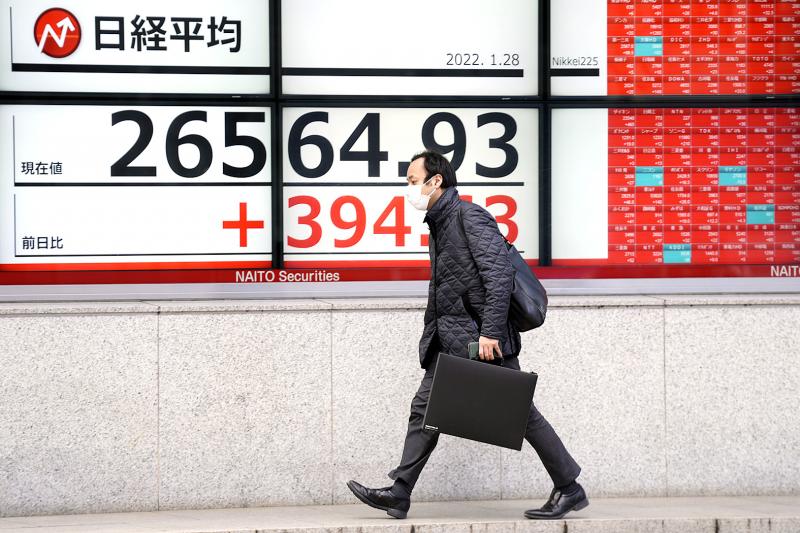Some Asian stocks rebounded on Friday after steep losses in the previous session as strong US economic growth and Apple Inc’s impressive earnings offset some bearishness generated by the US Federal Reserve’s hawkish comments.
US stock futures rose in Asia trade with NASDAQ futures up 0.77 percent and S&P 500 e-minis up 0.48 percent after Apple on Thursday reported record sales in the holiday quarter. Apple shares rose more than 5 percent in after-hours trading.
MSCI’s broadest index of Asia-Pacific shares outside Japan was up 0.4 percent after sliding 2.26 percent on Thursday. The index is still down 5.1 percent so far this month.

Photo: AP
“After [a] big sell-off earlier this week amid a hawkish stance by the Fed, we are seeing several markets in Asia recover from some of the heavy losses today,” said Zhang Zihua (張子華), chief investment officer at Beijing Yunyi Asset Management.
Tokyo’s benchmark Nikkei 225 rose 2.09 percent to 26,717.34, but lost 2.92 percent from a week earlier. Fuji Electric surged 9.68 percent to become the Nikkei’s biggest percentage gainer, after posting strong earnings late on Thursday.
The broader TOPIX gained 1.87 percent to 1,876.89, down 2.61 percent on the week.
Seoul’s KOSPI increased 1.87 percent to 2,663.34, losing 6.03 percent from a week earlier, while Sydney’s S&P/ASX 200 rose 2.19 percent to 6,988.1, down 2.62 percent on the week.
Hong Kong’s Hang Seng index fell on Friday, capping off its worst week since August last year amid global investor jitters sparked by rising expectations of monetary tightening by the Fed.
At the close of trade, the Hang Seng was down 56.92 points, or 1.08 percent, at 23,550.08. The index lost 5.67 percent on the week, its biggest weekly percentage drop in 23 weeks.
The Shanghai Composite Index declined 0.97 percent to 3,361.44, losing 4.57 percent from a week earlier.
India’s SENSEX dipped 0.13 percent to 57,200.23, posting a weekly decline of 3.11 percent.
In Taiwan, the equity market is closed until Sunday next week, because of the Lunar New Year holiday. It last closed down 26.72 points, or 0.15 percent, at 17,674.40 on Wednesday, with turnover of NT$224.109 billion (US$8.05 billion). It declined 1.16 percent from Friday last week.
Additional reporting by staff writer, with CNA

In Italy’s storied gold-making hubs, jewelers are reworking their designs to trim gold content as they race to blunt the effect of record prices and appeal to shoppers watching their budgets. Gold prices hit a record high on Thursday, surging near US$5,600 an ounce, more than double a year ago as geopolitical concerns and jitters over trade pushed investors toward the safe-haven asset. The rally is putting undue pressure on small artisans as they face mounting demands from customers, including international brands, to produce cheaper items, from signature pieces to wedding rings, according to interviews with four independent jewelers in Italy’s main

Macronix International Co (旺宏), the world’s biggest NOR flash memory supplier, yesterday said it would spend NT$22 billion (US$699.1 million) on capacity expansion this year to increase its production of mid-to-low-density memory chips as the world’s major memorychip suppliers are phasing out the market. The company said its planned capital expenditures are about 11 times higher than the NT$1.8 billion it spent on new facilities and equipment last year. A majority of this year’s outlay would be allocated to step up capacity of multi-level cell (MLC) NAND flash memory chips, which are used in embedded multimedia cards (eMMC), a managed

Japanese Prime Minister Sanae Takaichi has talked up the benefits of a weaker yen in a campaign speech, adopting a tone at odds with her finance ministry, which has refused to rule out any options to counter excessive foreign exchange volatility. Takaichi later softened her stance, saying she did not have a preference for the yen’s direction. “People say the weak yen is bad right now, but for export industries, it’s a major opportunity,” Takaichi said on Saturday at a rally for Liberal Democratic Party candidate Daishiro Yamagiwa in Kanagawa Prefecture ahead of a snap election on Sunday. “Whether it’s selling food or

In the wake of strong global demand for AI applications, Taiwan’s export-oriented economy accelerated with the composite index of economic indicators flashing the first “red” light in December for one year, indicating the economy is in booming mode, the National Development Council (NDC) said yesterday. Moreover, the index of leading indicators, which gauges the potential state of the economy over the next six months, also moved higher in December amid growing optimism over the outlook, the NDC said. In December, the index of economic indicators rose one point from a month earlier to 38, at the lower end of the “red” light.